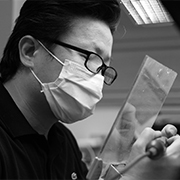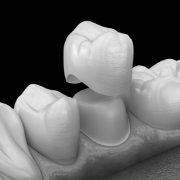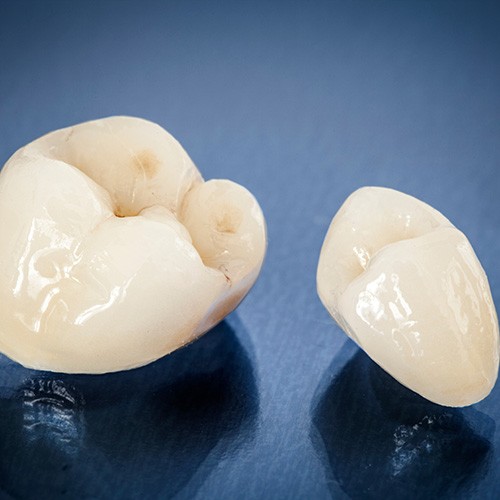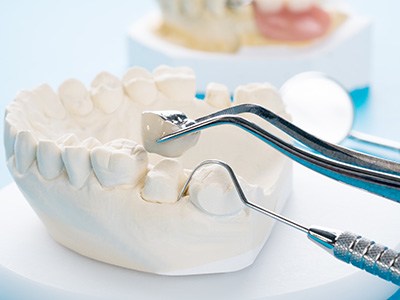Dental Crowns – Boston, MA
Protect & Beautify Teeth with Hand-Crafted Dental Crowns

Dental crowns offer aesthetic as well as functional benefits for teeth that are severely misshapen or discolored, have been treated in the past, or are currently damaged. Our team of experts, as well as our master ceramist, will work together to create a restoration that looks beautiful and offers long-term protection to your tooth, so you can continue enjoying it for years to come, so contact our team to schedule your next appointment for dental crowns in Boston.
Why Choose Boston Prosthodontics Dental Group for Dental Crowns?
- A World-Renowned Team of Prosthodontists
- In-House Dental Laboratory & Master Ceramist
- Concierge Staff That Prioritizes Attention to Detail & Patient-Centered Care
What Is a Dental Crown?

A dental crown is designed to be secured over the top biting surface of a compromised tooth. A crown can be made from a variety of high-quality dental materials, including porcelain-fused-to-metal, ceramic, zirconia, and gold, depending on your smile goals and needs. If you choose to have yours crafted from tooth-colored material, like ceramic, it will be hand-made in our dental laboratory by our master ceramist.
Who Is a Good Candidate for Dental Crowns?

- Patients with Missing Teeth Missing teeth can be replaced by an implant-retained dental crown. Dental implants are designed to support several types of dental restorations, depending on how many teeth need to be rebuilt.
- Patients with Aesthetic Concerns If you are not a good candidate for other cosmetic dentistry treatments, crowns can improve a versatile range of imperfections. Your prosthodontist will match the high-quality ceramic to your existing tooth enamel so that the finished product is virtually indistinguishable.
- Patients with Broken or Weakened Teeth Dental crowns can provide the coverage a struggling tooth needs. When cracks and other breakages cannot be repaired with bonding or fillings, a crown caps the entire surface, offering much-needed support.
- Patients Who Have Undergone Root Canal Treatment Dental crowns are often needed after root canals because they help to protect the treated structure from the risk of future infection.
The Dental Crown Process
Stage 1. Preparation

We treat your affected tooth (or teeth) with any preparatory procedures such as a root canal, to eliminate decay and bacterial infection. We then modify the tooth by shaving down a layer of surface enamel to allow room for the restoration.
Stage 2. Dental Impressions

Your prosthodontist takes an impression of your mouth, allowing our master ceramist to custom design your restoration to fit comfortably yet snugly between existing teeth.
Stage 3. Temporary Crown

Your prosthodontist places a temporary crown on your tooth while the design for your permanent crown is crafted in our dental laboratory.
Stage 4. Fabrication of Crown

Our world-class dental lab crafts your restoration from porcelain or another material of your choice. The on-site location allows for a quicker turnaround time and more convenient treatment for our patients.
Stage 5. Placement

Once the permanent crown is finished, you will return to the office to have it placed. Your prosthodontist checks the fit and secures the restoration with dental cement for optimal functionality and longevity.
The Benefits of Getting a Dental Crown

There are several benefits that you can enjoy from fortifying your tooth with a dental crown, including:
- Relieve discomfort associated with the oral health issue the crown is treating, like dental sensitivity.
- The dental crown will protect what remains of the natural tooth from further damage.
- Hand-made restorations are made to our prosthodontists’ precise specifications.
- Improve the appearance of misshapen or damaged teeth.
- By securing a dental crown to an implant, you can replace a single missing tooth functionally and esthetically.
Understanding the Cost of Dental Crowns

Now that you know more about what dental crowns are and why you might need one, you’re probably wondering how much they cost. There is no single answer because the total due varies from person to person based on their unique circumstances. That said, we’ll gladly provide a detailed estimate of expenses after you’ve consulted with one of our Boston Prosthodontics Dental Group experts for your approval before moving forward.
Continue reading to learn more about how the final amount is calculated, and feel free to contact us with any additional questions!
Factors That Affect the Cost of Dental Crowns

There are several different factors that our team considers when calculating the rate of your dental crowns, including:
- Whether additional procedures are necessary. If we find that you need a root canal or gum disease therapy, you’ll be expected to cover those treatments, too.
- The material used. Your restoration can be made from various materials, such as gold, zirconia, ceramic, and porcelain-fused-to-metal, which can impact the price.
- How it’s made. If your prosthetic is created at a dental lab, it tends to be less expensive than one created onsite with CEREC technology.
If you’re on a tight budget, you might be tempted to select the least costly options, but when it comes to dental work, you often get what you pay for. It’s often worth investing more to have a quality crown that effectively preserves your tooth’s functionality while restoring its appearance.
Does Dental Insurance Cover Dental Crowns?

Many dental insurance policies cover about 50% of major procedures like dental crowns. However, all plans are different, and there’s no guarantee, so it’s worth checking the details of your coverage to verify your benefits.
If you’re struggling to find the information you need or require assistance with any paperwork or claims, please don’t hesitate to let us know! Our friendly office staff are familiar with many insurance providers and can help you maximize your benefits.
Options for Making Dental Crowns Affordable

These restorations effectively preserve your natural teeth in situations that might otherwise require extraction and replacement, which are more expensive. Although we understand that everybody doesn’t carry dental insurance, we don’t want your budget to keep you from receiving care that can save your smile. If you’re concerned about not being able to afford your prosthetics, please let us know! We’re happy to discuss different options with you so you can have the procedure without breaking the bank.
Dental Crowns FAQs
Are Dental Crowns Permanent?
While dental crowns are not considered permanent, they are a long-term solution that can last anywhere from five to fifteen years on average before needing replacement. However, the process of placing a dental crown is irreversible since we’ll have to remove some enamel that will not grow back. A tooth that receives a dental crown must wear one from then on to protect it from injury and infection. However, a crown is usually placed to protect and restore a tooth that has been compromised by injury or decay, allowing it to last much longer than it would have otherwise. A few great ways to keep your crown in excellent shape are to practice excellent oral hygiene, see us at our Boston office twice a year for regular dental appointments, and limit your sugar consumption to prevent new oral infections.
How Long Do Dental Crowns Last?
Dental crowns usually last between five and fifteen years, but their lifespans greatly depend on what material they are made from. While metal crowns may have a longer lifespan than metal-free ones, the difference is often negligible. The most important factor in how long your crown can last is how well you care for it by practicing proper oral hygiene, limiting your sugar intake, and avoiding destructive habits like smoking, nail-biting, teeth grinding, and chewing on non-food items like ice, writing utensils, or paperclips. Crowns placed on the front teeth may last longer than those placed on the molars since they usually do not endure as much pressure during the chewing process.
How Do You Know When a Dental Crown Needs to Be Replaced?
The only way we can know for sure if your crown needs replacement is to evaluate it at our Boston office, but there may be a few noticeable signs that your appliance is ready to retire. Some of these include:
- Pain: Your dental crown should be perfectly comfortable after you get used to wearing it. If you experience pain in a crowned tooth, it may be because tooth decay has set in under the appliance. After we remove the crown to treat the tooth, we may need to replace it if we cannot fix it back in place.
- Instability: Please contact our office if your crown seems loose, especially if you have recently eaten something sticky.
- Deteriorated appearance: A dental crown is intended to beautifully restore your smile. If you notice chips or discoloration in your appliance, this may be reason enough to have it replaced.
- A dark line around the base: If your crown is beginning to show a dark line around the root of the tooth, this may be because the porcelain section is separating from the metal section. In this case, the crown needs replacement.
Do Dental Crowns Get Cavities?
Since crowns are made from ceramic materials, metal, or some combination of the two, it is impossible for them to develop cavities. However, the tooth wearing a crown can experience cavities if the patient doesn’t take proper care of it. Neglecting one’s oral hygiene allows harmful oral bacteria to accumulate in the mouth, resulting in infections that can destroy crowned and uncrowned teeth. A few excellent ways to prevent your tooth from becoming infected after receiving a crown are seeing your dentist regularly, practicing excellent oral care at home by brushing, flossing, and using antibacterial mouthwash every day, and cutting back on your sugar intake.
